St Austell Brewery produced 15,000 barrels of beer in 1999. Enter Tribute, its 4.2% Cornish Pale Ale, and 14 years later that beer accounted for more than 60,000 barrels alone. Now, in 2017, the brewery outputs around 115,000 barrels, and it has beers such as Tribute and Proper Job to thank for that. But Ryman, brewing director at St Austell, is refusing to rest on his laurels.
“The market is constantly changing. I’ve been part of this game since 1988 so I’ve seen enough of them,” he explains. “Growth for us now is mainly in bottle and keg, while cask has levelled out a bit. And I have to say, I do worry about cask beer in the longterm. Lots of breweries are moving out of cask beer production and I get and understand that decision. With cask, we all know that a great beer served in perfect condition has few rivals but the challenge for cask beer is, of course, the trade.”
Ryan continues: “Breweries have little control over how the beer they have produced is served in the pub and it obviously has a limited shelf life. We are also part of a changing drinking landscape where people are drinking less, drinking quality over and in a more varied amount of venues. And as a result, this draws from the traditional market of cask beer. Look at the breweries leaving, there is a sound business decision behind that.
“In truth, cask beer is oversupplied. There are low barriers of entry and too many new breweries are doing it. The market is well supplied and the pressures of that market dictate the price, which see it pushed down. With keg still somewhat of a speciality, drinkers are less price-sensitive and are happy to pay more, with better margins to be had for the brewer.
“So maybe we will eventually end up at a point where cask beer becomes the preserve of specialist places, that look after it. Places that pay the brewery the price it deserves and attracts drinkers that are happy to pay the price it warrants. And if that means I live in world where the local I don’t go to anyway stops serving cask beer, is that necessarily a bad thing? As long as there is somewhere that will serve me a great cask beer, then that is fine with me.”
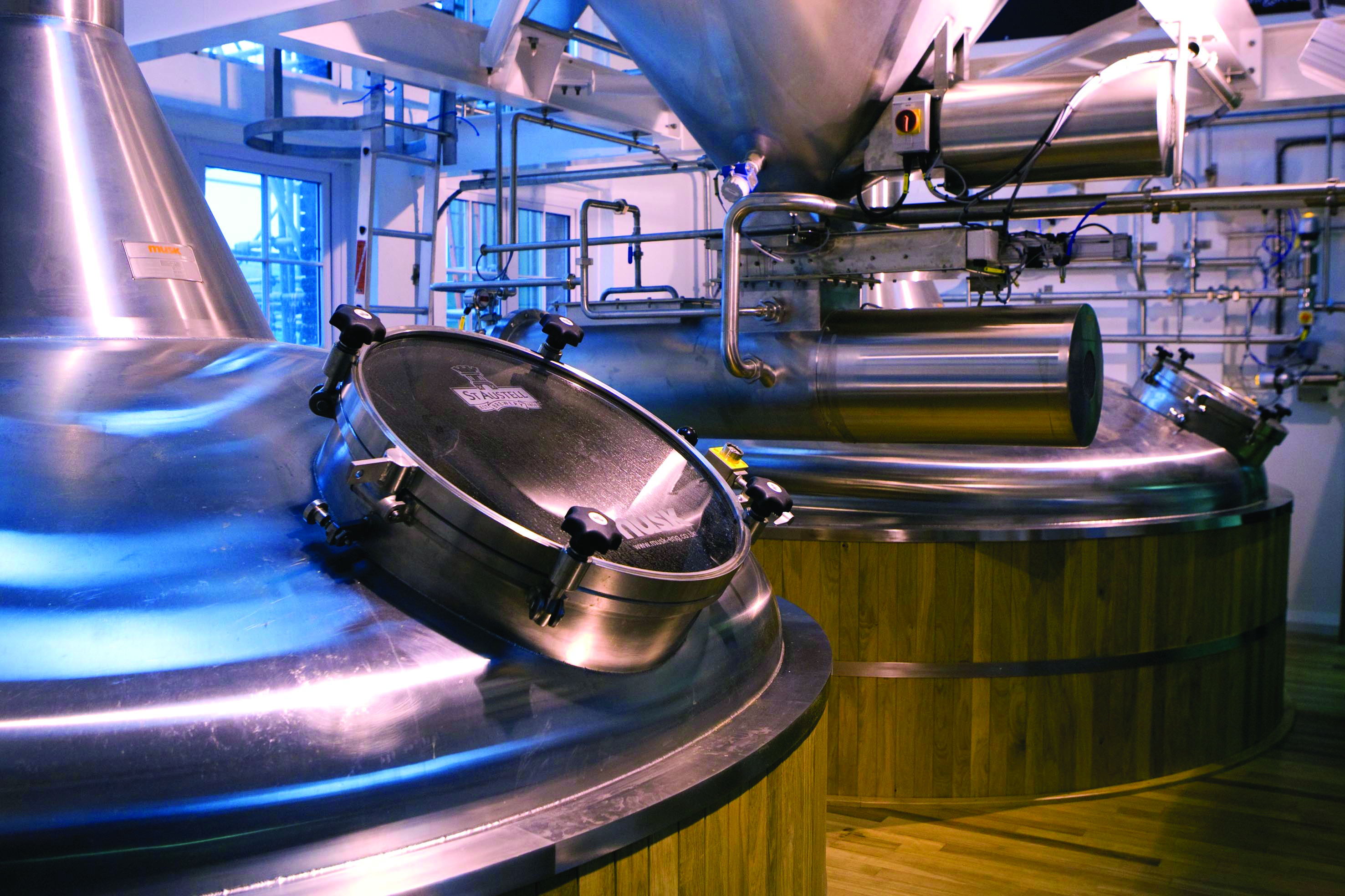
Ryman is in a pensive mood. Work, and his love for beer, is set to take him to Germany and Belgium following our meeting but at this moment his mind is firmly focused on the future of UK beer.
“I have to say, I respect (beer author and journalist) Pete Brown. When he speaks he is well thought out and pragmatic. I recently took in one of his talks that looked at the idea whether the current UK beer landscape was undergoing a fad or a revolution. He pointed out that a fad was more a ‘Here today, Gone tomorrow’ situation while the latter, a revolution, ends up changing the landscape and I think the beer market has most definitely changed. And for the better, too,” he explains.
“I’ve been involved in beer since 1988 and the transformation we’ve undertaken in the last ten years or so has been major. At one point every drinker was knocking back Caffrey’s, then it was Stella Artois, and then it was bottles of Magners cider over ice. And now we are seeing an increasingly large amount of people drinking good beer. Sure, those drinking habits remain, but they are being challenged by excellent UK breweries.
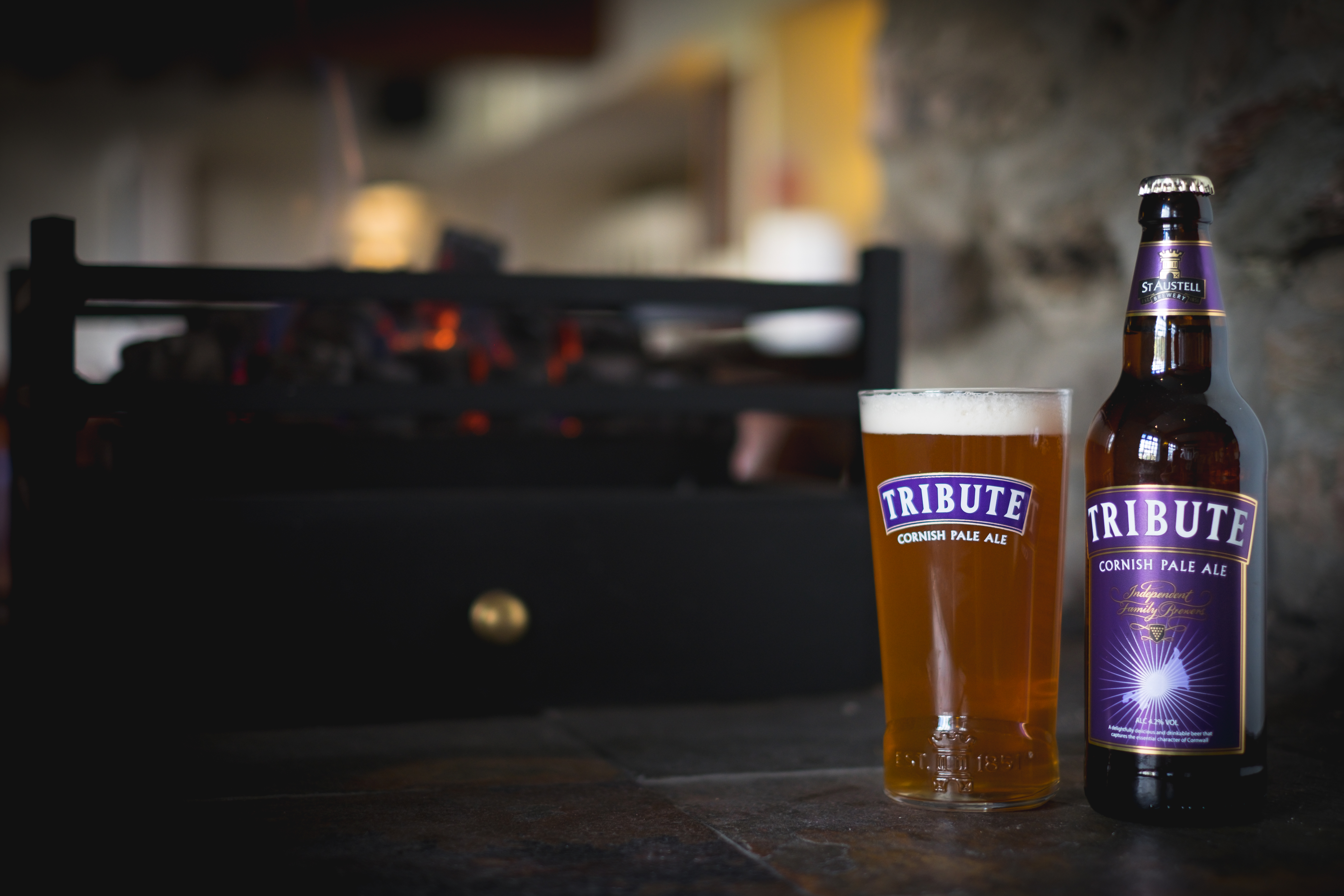
But for Ryman, he is acutely aware that at some point, the heat in the market will die down. Figures released late last year confirmed that there were 1,700 breweries in the UK, a 8% jump in the previous 12 months and a figure that has no doubt grown since. But while the pub trade is still losing an average of 21 establishments a week, market pressures will soon come into play.
“The rate breweries are opening will die down at some point and there will be closures during this period, too. But this growth in breweries will find a natural balance at some point. Whether that is at 1500, 2000 or 3000, I don’t know,” he says. “However, if you extrapolate the current brewer openings, it would not be long before there are close to 5,000 breweries and no pubs. Market forces will ensure that wasn’t happen as people want to enjoy beer in the on trade environment. But where that balance is, nobody really knows. Natural selection is taking place in pubs, and it will continue to take place in breweries. Both need to avoid complacency and offer the customer a reason to invest in their product.”
So what advice would Ryman give a new brewery opening today?
“Before you event start, I’d ask where you are selling that beer. I was told in the past that I was in the business of selling beer so anyone going into this industry needs to know that from the off. I would also want to know what separates you from the competition,” says Ryman.
“If I was opening a brewery, I’d open a pub first. The latter gives you a market, a point of difference and the ability to sell it direct to the consumer. If you could do that, why wouldn’t you? That’s why we are seeing more taprooms and micropubs opening. People like to drink from the source, and to be in that environment, while the brewery has a direct route to their customer. It’s quite simple.”
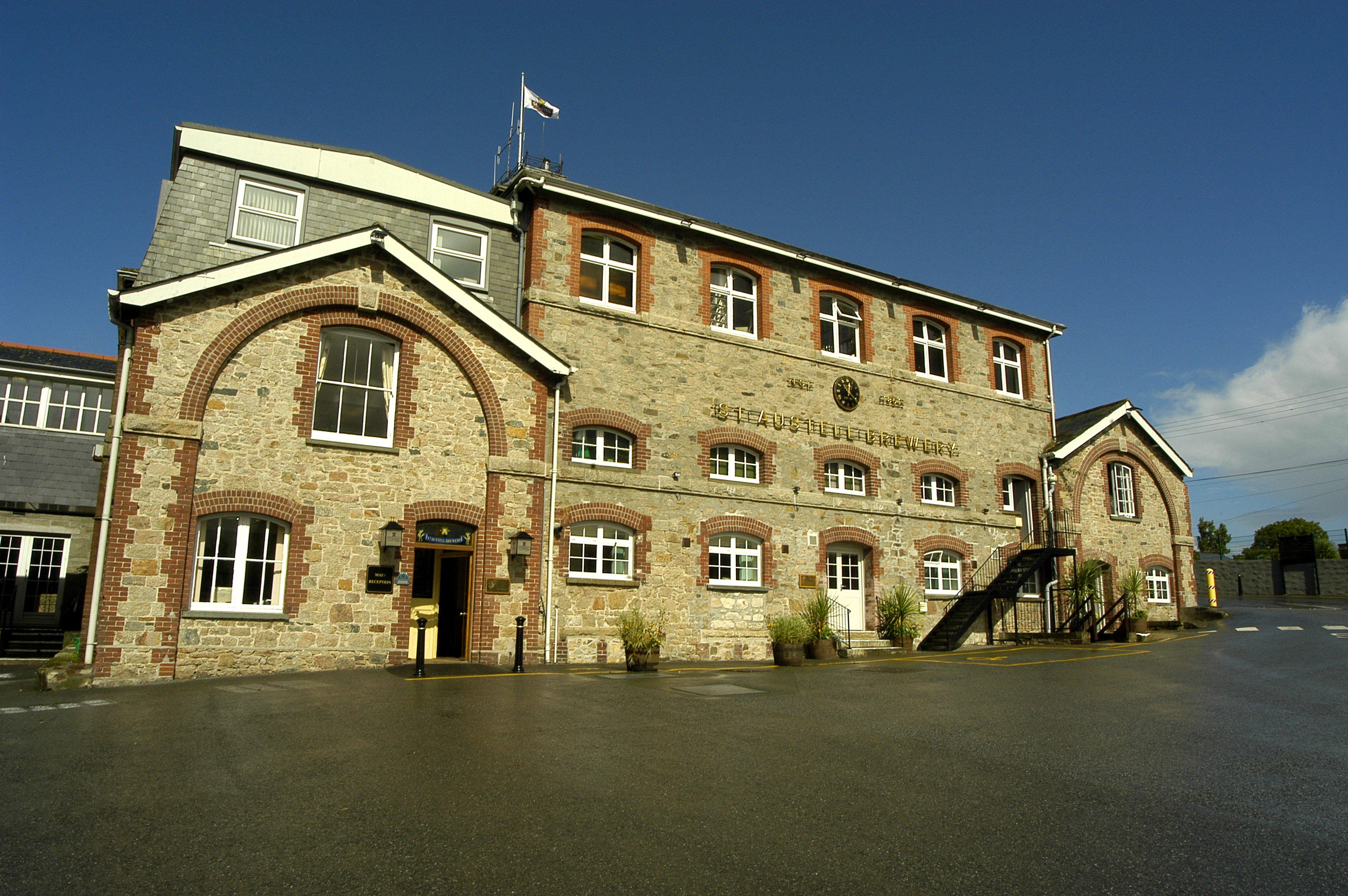
Ryman is an advocate of consistency and quality, factors that fed into his brief when creating ‘Tribute’ in the late nineties. It was his first project for the brewery, and an opportunity he grasped with both hands.
“There was a clear opportunity for me at that time. St Austell did not offer a beer between 3.7 and 5%, while Cornwall as a whole lacked a modern golden ale that was both clean, bright and balanced. It was also characterised by late hopping with fruity aromatic hop varieties. I was obviously more than keen to make my mark and create something that was the opposite of the other beers St Austell was producing,” he says.
Ryman decided that Tribute was to be paler in colour, fuller of palate, while also being more balanced, softer and cleaner. “I wanted moderate bitterness and aromatic late hopping delivered by blending Willamette and Styrian Golding hops Slovenia.”
And it is those factors that Ryman believes could help form the backbone of a successful keg beer in 2017.
“I firmly believe there is a market for a solid, well-made, drinkable keg beer that is well-branded and well-supported. I was recently part of a judging panel that comprised judges from across the world. I made an interesting observation as during the break, there was the opportunity for a drinks break. There was a cask beer on offer that was ok, nothing more,” he explains.
“There was also a pilsner and a keg red beer around the 4.5% mark. More than half were drinking the latter. If the beer judges from across the globe were opting to drink that, was does that say? I think the production future of well-made, accessible beers, that are nicely branded, will be in ascendancy. It goes back to what I said about the market changing.”
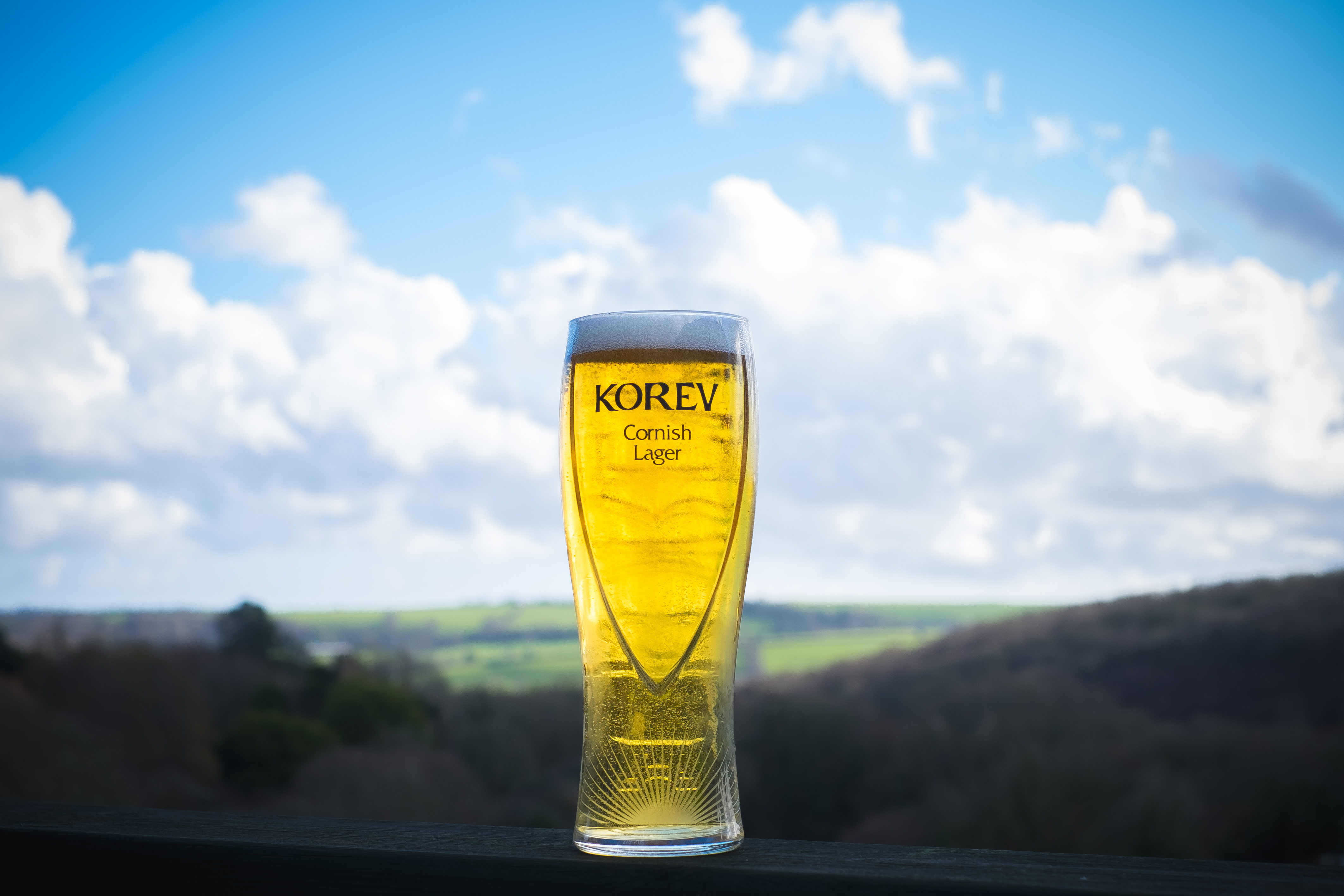
Ryman adds: The days of commodity beer days that are just about acceptable are behind us. But what is frightening is that when the big guys really start to catch on and crank this up. There is no reason why a big brewer cannot make a very, very, good beer. What often inhibits that ability is the desire to purchase quality raw materials but if you have the financial muscle, and decide to go for it. the rest of us have to worry.
“You only have to look at some of the big, multinational-funded breweries popping up in the UK and beyond. They are very capable and can turn their hand to producing what they want, if they want to.”
At St Austell, its Korev lager has grown nicely, complementing the successes of Tribute and Proper Job, but Ryman stresses that anyone that studies product lifecycle in business will see a maturity and then a plateau of a product, ensuring the need to be working on what’s coming next, even when a current product is in its growth phase. And in 2017, St Austell continues to explore a wealth of beer styles to help broaden its product offering while very few would be aware the brewery produced 70 different beers in 2016 alone.
Eureka and Underdog are have become permanent additions to its permanent draught portfolio. The former is a 4.9% ABV single-hopped American pale ale an is the first beer that’s been launched as a permanent brew from St Austell’s Small Batch Brewery. The latter is a 3.5% session IPA that features the as yet un-named US 7270 hop in addition to Galaxy and Simcoe.
“Eureka is a big moment for us as it’s the first beer from our innovative Small Batch Brewery that has been made available to the on-trade nationwide. After a great response, it made total sense to launch Eureka as a core brand to allow it to reach even more beer-lovers,” says Ryman. “With Underdog, what it intentionally lacks in ABV it more than makes up for in flavour. We’ve been brave with it as it is unfiltered but it glows from the glass. We believe there is a gap in the market for a high flavour low alcohol IPA and this memorable beer will leave pub-goers asking for more.”
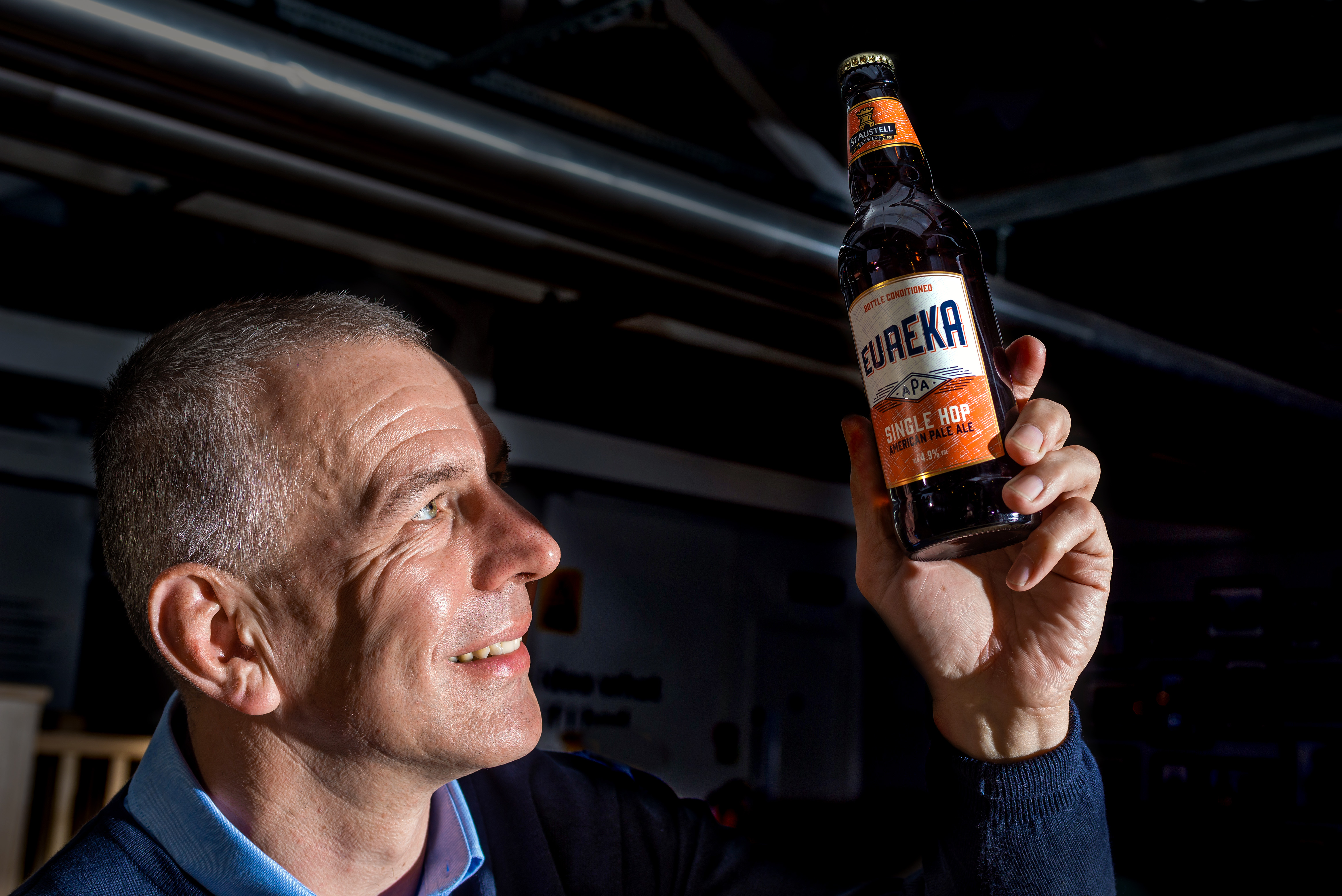
Those two beers form part of a bigger picture, one that involved the production of 70 different beers last year that include a Gose, Saison, Rauch, Berliner Weisse and an Imperial Russian Stout. The stout is a personal project of Ryman’s and one drawn from the archive of Imperial Russian Stout from Courage. It was also brewed in Moscow and is currently in casks ahead of a release next year.
Small batch operations at St Austell complement its more commercial operations. These operations comprise a 13bbl and a 2bbl setup and enable the brewery to run initiatives such as its recent cask programme across 40 pubs. Each pub signs up to 12 beers over three months and receives one firkin each week, enabling variety at both brewery and the on-trade.
With the wealth of brewing activity taking place in Cornwall, it would be easy to forget the other side of Ryman’s brewing director role at Bath Ales. Earlier this year, the company announced that brewing capacity at Bath Ales was to increase to up to 50,000 brewers’ barrels following the installation of a new brewery from Musk Engineering.
New bottling and canning facilities also form part of the company’s expansion plans thanks to a multi-million pound investment by St Austell Brewery, which acquired the business last Summer. Ryman says he is “hugely excited” about the year ahead and also the prospects at the new Hare Brewery, with work beginning in September and expected to be complete by Spring 2018.
“At both breweries, there’s a continued appreciation of only crafting the highest quality beers. Since we have come together I have been very impressed with the skills and capabilities of the Bath Ales brewing team.We will continue to give them the support and resources they need to succeed and deliver what they have the potential to do,” he says. “After a rigorous process, we’re delighted to have commissioned Musk to build the new brewery. We have an excellent working relationship with Musk’s engineering and design teams, having worked with them during the installation of a major upgrade of the facilities at our brewing home in St Austell. We know they will deliver on the vision we have for the new brewery.”
Ryman explains that the opportunity to specify a brewery expansion is a “privilege”, a noun he uses to describe his career at St Austell to date.
“It has been unique and career defining for me. There is no chance of getting bored and there is always a new opportunity to grasp. Being tongue in cheek, you could say I am looking after five separate brewing sites across both businesses now but with that breadth of responsibility, I am still happiest in the brewery and when I end the day with malt under the fingernails,” he says. “And still being able to do that is a great thing. I love brewing beer and totally feel that if you brew good beer, you will find a market and you will sell it. I fundamentally believe that. Our values are to brew the best beer possible. Whether that is Tribute or a Berliner Weisse, it doesn’t matter. It’s about brewing the best beer you can.”
In Interview | Roger Ryman, St Austell
St Austell Brewery produced 15,000 barrels of beer in 1999. Enter Tribute, its 4.2% Cornish Pale Ale, and 14 years later that beer accounted for more than 60,000 barrels alone. Now, in 2017, the brewery outputs around 115,000 barrels, and it has beers such as Tribute and Proper Job to thank for that. But Ryman, brewing director at St Austell, is refusing to rest on his laurels.
“The market is constantly changing. I’ve been part of this game since 1988 so I’ve seen enough of them,” he explains. “Growth for us now is mainly in bottle and keg, while cask has levelled out a bit. And I have to say, I do worry about cask beer in the longterm. Lots of breweries are moving out of cask beer production and I get and understand that decision. With cask, we all know that a great beer served in perfect condition has few rivals but the challenge for cask beer is, of course, the trade.”
Ryan continues: “Breweries have little control over how the beer they have produced is served in the pub and it obviously has a limited shelf life. We are also part of a changing drinking landscape where people are drinking less, drinking quality over and in a more varied amount of venues. And as a result, this draws from the traditional market of cask beer. Look at the breweries leaving, there is a sound business decision behind that.
“In truth, cask beer is oversupplied. There are low barriers of entry and too many new breweries are doing it. The market is well supplied and the pressures of that market dictate the price, which see it pushed down. With keg still somewhat of a speciality, drinkers are less price-sensitive and are happy to pay more, with better margins to be had for the brewer.
“So maybe we will eventually end up at a point where cask beer becomes the preserve of specialist places, that look after it. Places that pay the brewery the price it deserves and attracts drinkers that are happy to pay the price it warrants. And if that means I live in world where the local I don’t go to anyway stops serving cask beer, is that necessarily a bad thing? As long as there is somewhere that will serve me a great cask beer, then that is fine with me.”
Ryman is in a pensive mood. Work, and his love for beer, is set to take him to Germany and Belgium following our meeting but at this moment his mind is firmly focused on the future of UK beer.
“I have to say, I respect (beer author and journalist) Pete Brown. When he speaks he is well thought out and pragmatic. I recently took in one of his talks that looked at the idea whether the current UK beer landscape was undergoing a fad or a revolution. He pointed out that a fad was more a ‘Here today, Gone tomorrow’ situation while the latter, a revolution, ends up changing the landscape and I think the beer market has most definitely changed. And for the better, too,” he explains.
“I’ve been involved in beer since 1988 and the transformation we’ve undertaken in the last ten years or so has been major. At one point every drinker was knocking back Caffrey’s, then it was Stella Artois, and then it was bottles of Magners cider over ice. And now we are seeing an increasingly large amount of people drinking good beer. Sure, those drinking habits remain, but they are being challenged by excellent UK breweries.
But for Ryman, he is acutely aware that at some point, the heat in the market will die down. Figures released late last year confirmed that there were 1,700 breweries in the UK, a 8% jump in the previous 12 months and a figure that has no doubt grown since. But while the pub trade is still losing an average of 21 establishments a week, market pressures will soon come into play.
“The rate breweries are opening will die down at some point and there will be closures during this period, too. But this growth in breweries will find a natural balance at some point. Whether that is at 1500, 2000 or 3000, I don’t know,” he says. “However, if you extrapolate the current brewer openings, it would not be long before there are close to 5,000 breweries and no pubs. Market forces will ensure that wasn’t happen as people want to enjoy beer in the on trade environment. But where that balance is, nobody really knows. Natural selection is taking place in pubs, and it will continue to take place in breweries. Both need to avoid complacency and offer the customer a reason to invest in their product.”
So what advice would Ryman give a new brewery opening today?
“Before you event start, I’d ask where you are selling that beer. I was told in the past that I was in the business of selling beer so anyone going into this industry needs to know that from the off. I would also want to know what separates you from the competition,” says Ryman.
“If I was opening a brewery, I’d open a pub first. The latter gives you a market, a point of difference and the ability to sell it direct to the consumer. If you could do that, why wouldn’t you? That’s why we are seeing more taprooms and micropubs opening. People like to drink from the source, and to be in that environment, while the brewery has a direct route to their customer. It’s quite simple.”
Ryman is an advocate of consistency and quality, factors that fed into his brief when creating ‘Tribute’ in the late nineties. It was his first project for the brewery, and an opportunity he grasped with both hands.
“There was a clear opportunity for me at that time. St Austell did not offer a beer between 3.7 and 5%, while Cornwall as a whole lacked a modern golden ale that was both clean, bright and balanced. It was also characterised by late hopping with fruity aromatic hop varieties. I was obviously more than keen to make my mark and create something that was the opposite of the other beers St Austell was producing,” he says.
Ryman decided that Tribute was to be paler in colour, fuller of palate, while also being more balanced, softer and cleaner. “I wanted moderate bitterness and aromatic late hopping delivered by blending Willamette and Styrian Golding hops Slovenia.”
And it is those factors that Ryman believes could help form the backbone of a successful keg beer in 2017.
“I firmly believe there is a market for a solid, well-made, drinkable keg beer that is well-branded and well-supported. I was recently part of a judging panel that comprised judges from across the world. I made an interesting observation as during the break, there was the opportunity for a drinks break. There was a cask beer on offer that was ok, nothing more,” he explains.
“There was also a pilsner and a keg red beer around the 4.5% mark. More than half were drinking the latter. If the beer judges from across the globe were opting to drink that, was does that say? I think the production future of well-made, accessible beers, that are nicely branded, will be in ascendancy. It goes back to what I said about the market changing.”
Ryman adds: The days of commodity beer days that are just about acceptable are behind us. But what is frightening is that when the big guys really start to catch on and crank this up. There is no reason why a big brewer cannot make a very, very, good beer. What often inhibits that ability is the desire to purchase quality raw materials but if you have the financial muscle, and decide to go for it. the rest of us have to worry.
“You only have to look at some of the big, multinational-funded breweries popping up in the UK and beyond. They are very capable and can turn their hand to producing what they want, if they want to.”
At St Austell, its Korev lager has grown nicely, complementing the successes of Tribute and Proper Job, but Ryman stresses that anyone that studies product lifecycle in business will see a maturity and then a plateau of a product, ensuring the need to be working on what’s coming next, even when a current product is in its growth phase. And in 2017, St Austell continues to explore a wealth of beer styles to help broaden its product offering while very few would be aware the brewery produced 70 different beers in 2016 alone.
Eureka and Underdog are have become permanent additions to its permanent draught portfolio. The former is a 4.9% ABV single-hopped American pale ale an is the first beer that’s been launched as a permanent brew from St Austell’s Small Batch Brewery. The latter is a 3.5% session IPA that features the as yet un-named US 7270 hop in addition to Galaxy and Simcoe.
“Eureka is a big moment for us as it’s the first beer from our innovative Small Batch Brewery that has been made available to the on-trade nationwide. After a great response, it made total sense to launch Eureka as a core brand to allow it to reach even more beer-lovers,” says Ryman. “With Underdog, what it intentionally lacks in ABV it more than makes up for in flavour. We’ve been brave with it as it is unfiltered but it glows from the glass. We believe there is a gap in the market for a high flavour low alcohol IPA and this memorable beer will leave pub-goers asking for more.”
Those two beers form part of a bigger picture, one that involved the production of 70 different beers last year that include a Gose, Saison, Rauch, Berliner Weisse and an Imperial Russian Stout. The stout is a personal project of Ryman’s and one drawn from the archive of Imperial Russian Stout from Courage. It was also brewed in Moscow and is currently in casks ahead of a release next year.
Small batch operations at St Austell complement its more commercial operations. These operations comprise a 13bbl and a 2bbl setup and enable the brewery to run initiatives such as its recent cask programme across 40 pubs. Each pub signs up to 12 beers over three months and receives one firkin each week, enabling variety at both brewery and the on-trade.
With the wealth of brewing activity taking place in Cornwall, it would be easy to forget the other side of Ryman’s brewing director role at Bath Ales. Earlier this year, the company announced that brewing capacity at Bath Ales was to increase to up to 50,000 brewers’ barrels following the installation of a new brewery from Musk Engineering.
New bottling and canning facilities also form part of the company’s expansion plans thanks to a multi-million pound investment by St Austell Brewery, which acquired the business last Summer. Ryman says he is “hugely excited” about the year ahead and also the prospects at the new Hare Brewery, with work beginning in September and expected to be complete by Spring 2018.
“At both breweries, there’s a continued appreciation of only crafting the highest quality beers. Since we have come together I have been very impressed with the skills and capabilities of the Bath Ales brewing team.We will continue to give them the support and resources they need to succeed and deliver what they have the potential to do,” he says. “After a rigorous process, we’re delighted to have commissioned Musk to build the new brewery. We have an excellent working relationship with Musk’s engineering and design teams, having worked with them during the installation of a major upgrade of the facilities at our brewing home in St Austell. We know they will deliver on the vision we have for the new brewery.”
Ryman explains that the opportunity to specify a brewery expansion is a “privilege”, a noun he uses to describe his career at St Austell to date.
“It has been unique and career defining for me. There is no chance of getting bored and there is always a new opportunity to grasp. Being tongue in cheek, you could say I am looking after five separate brewing sites across both businesses now but with that breadth of responsibility, I am still happiest in the brewery and when I end the day with malt under the fingernails,” he says. “And still being able to do that is a great thing. I love brewing beer and totally feel that if you brew good beer, you will find a market and you will sell it. I fundamentally believe that. Our values are to brew the best beer possible. Whether that is Tribute or a Berliner Weisse, it doesn’t matter. It’s about brewing the best beer you can.”
ARTICLES
Molson Coors pledges £100 million investment in UK production
Comment | Turn the temperature down on rising costs
Budget 2024 | An opportunity missed
New process automation solution to “drive optimization and efficiency” improvements
PODCASTS